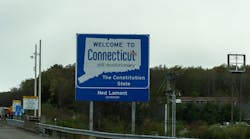The Connecticut legislature has approved the use of a Highway User Fee, a truck-focused tax estimated to raise $90 million annually to fund state infrastructure projects. According to the bill, the monthly tax will be imposed only on heavy-duty truck carriers for operating on any Connecticut highway, beginning on or after January 1, 2023.
In the Connecticut House, where the bill passed 88-59, every state Republican and six state Democrats voted against the bill. Two Democrats—State Sen. Norm Needleman (D-Essex), and State Sen. Dennis Bradley (D-Bridgeport)—joined the 12 Republicans in voting against the bill in the state Senate, where the legislation passed 22-14 on June 9.
According to the Connecticut General Assembly’s Office of Fiscal Analysis, a note on the legislation stated that each fee would vary based on vehicle weight. For example, vehicles with a gross weight ranging from 26,000 to 28,000 lb. would owe 2.5 cents per mile, while the cost for vehicles that weigh between 78,001 and 80,000 lb. would be 10 cents per mile.
“The fee is anticipated to generate $45 million in new revenue [in fiscal 2023] and $90 million annually thereafter, increasing by inflation,” the note explained.
Under this system, carriers that want to use a Connecticut highway must apply for a permit with the commissioner of the Department of Revenue Services and must report their own mileage to state tax officials.
“The modest fee that a truck company would have to pay us to drive the length of I-84, which is about $9, pales in comparison to the fact that, when that truck reaches the George Washington Bridge, they will pay $100 to cross one way on that bridge,” State Rep. Sean Scanlon (D-Guilford), said.
Explaining his support for the bill, Scanlon said that large trucks do the most damage to highways, and don’t contribute to highway funding aside from paying the International Fuel Tax Agreement (IFTA) and International Registration Plan that distributes fuel taxes and registration fees to all the states a truck drives through.
The bill does include one exemption for motor vehicles transporting milk or dairy products to or from a dairy farm that holds a license to ship milk.
“The House of Representatives passed the truck mileage tax, but not before voting to exempt the heaviest trucks on the road—dairy trucks—from paying the tax,” Joe Sculley, president of the Motor Transport Association of Connecticut (MTAC), said. “Those trucks operate at 100,000 pounds, while the limit for all other trucks is 80,000 pounds. This just goes to show that the truck mileage tax is not actually about damage to the roads, it’s just about money. Lighter weight trucks will be subsidizing heavier trucks that will be exempt from the tax.”
The public outcry within the trucking industry has erupted in response to the passing of the new state bill. Gov. Ned Lamont’s response, however, has been a passive one. In a tweet on June 9, Lamont responded to those threatening to drive around the state to avoid such fees.
“I was struck by the comment by the trucker’s lobbyist who said, ‘Watch out! A lot of the big tractor trailer trucks may avoid your Highway User Fee and end-run Connecticut,’” Lamont said. “Well that’s not so bad either. We’ll have a little less traffic on the road, a little less asthma for the people who live along the road, and we’ll still have the resources we need to make the investments we’ve got to.”
Despite Lamont’s indifference to the trucking industry’s reaction, it has not stopped its biggest advocates from speaking out.
“Governor Lamont and the legislature are applying a tax to all citizens in Connecticut, ensuring that families and businesses in the Nutmeg State have some of the most aggressive inflation in the country,” Sean McNally, vice president of public affairs at American Trucking Associations, said. “We believe the law is ill-conceived, poorly written, and truckers are evaluating whether it constitutes an unconstitutional tax on interstate commerce.
“Instead of equitable investment by all citizens, the politically spineless legislature has sought to hide these taxes in the price of food, vaccines, toilet paper, gasoline, clothes and more instead of equitable fees on all road users,” McNally added. “For this bad judgement, families and businesses in Connecticut will have less service, higher prices and fewer jobs.”
The Owner-Operator Independent Driver Association (OOIDA) did not hold back in its reaction to Lamont’s statements.
“Lamont's ignorance could fill a road train of 53-foot trailers,” OOIDA said in a tweet. His open hostility toward truckers is shocking. He has shown a complete lack of respect for those who keep his state running by hauling goods in and out of CT. When did politicians become so out of touch with reality?”
Todd Spencer, president of OOIDA, took to Twitter as well to share his thoughts on the matter.
Sculley elaborated on why he believes the Highway User Fee is guaranteed to fail.
“Proponents think that all they have to do is compare miles reported under the IFTA against miles reported under this new mileage tax,” Sculley explained. “They don’t realize that 1. Out-of-state trucking companies report their IFTA miles to their base state, and that Connecticut does not have access to those records, and 2. IFTA includes single-unit trucks, which this tax does not. Connecticut cannot do an apples-to-oranges comparison for purposes of enforcing this new tax. Connecticut is never going to see the money predicted for this bill, and this tax scheme will fail.”




